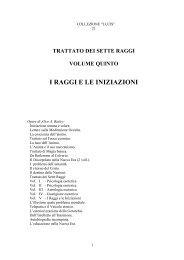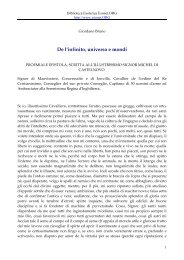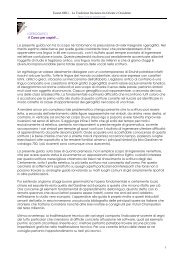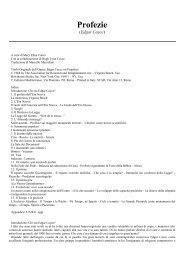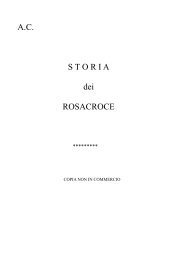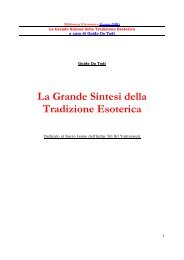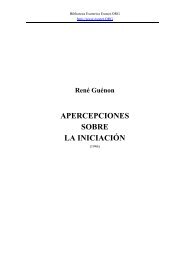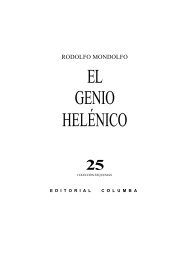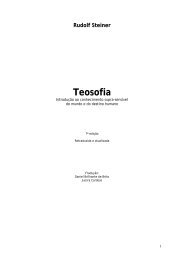Biblioteca Esoterica Esonet.ORG http://www.esonet.ORG 1
Biblioteca Esoterica Esonet.ORG http://www.esonet.ORG 1
Biblioteca Esoterica Esonet.ORG http://www.esonet.ORG 1
Create successful ePaper yourself
Turn your PDF publications into a flip-book with our unique Google optimized e-Paper software.
<strong>Biblioteca</strong> <strong>Esoterica</strong> <strong>Esonet</strong>.<strong>ORG</strong><br />
<strong>http</strong>://<strong>www</strong>.<strong>esonet</strong>.<strong>ORG</strong><br />
Astrology became widely misused because its cyclic foundation was not understood<br />
or was conveniently ignored by those who were concerned only with predicting existential<br />
events and favorable or unfavorable times to perform definite acts. The situation is<br />
actually the reverse; for what the knowledge of cyclic structure may reveal is what a<br />
particular phase of a cycle calls for in terms of types of events, rather than whether a brief,<br />
passing moment (or more broadly a particular phase) is favorable for a particular action.<br />
Astrology essentially deals with the structure of cycles — of wholes of time — not with<br />
concrete events. Moreover, it deals with time (as I have defined this term), not with the<br />
continuum of change itself, because the astrologer can be aware of this continuum only<br />
from the point of view of a human being on the surface of the earth. Moreover, the<br />
astrologer's awareness also is conditioned (in most instances) by the culture's particular<br />
approach to change and by the approach inherent in his or her temperament and personal<br />
character.<br />
The condemnation of astrology by the councils and officialdom of the Christian world<br />
logically followed that of any cyclic interpretation of human existence and spiritual<br />
destiny. Instead, existence came to be considered a "historical" process starting with the<br />
creation of the world and ending in a glorious consummation, which Teilhard de Chardin<br />
envisioned as a supreme moment of total incandescence and spiritual oneness with the<br />
glorious Christ. At the individual level, existence was thought to begin with birth — a<br />
totally new beginning for a newly created soul — and to end in a death leading to a<br />
timeless ("eternal") blessedness, or perhaps to total failure in hell. History was conceived,<br />
ideally, as a one-directional process of spiritualization. But most historians of today are<br />
not concerned with the entire one-way process, leading up or down; they are interested<br />
only in gathering a mass of information about existential events which (they assume)<br />
reveal the mood of a particular generation, at most of a century, in a particular culture and<br />
religion (as James Joyce in Ulysses was concerned only with one day in the life of an<br />
ordinary man). Arnold Toynbee's attempt to discover a cyclic pattern in the structural<br />
development of "civilization" is now considered fanciful and unrealistic.<br />
Nevertheless, the fundamental question is always, what is reality? For the materialist,<br />
it is a basically random sequence of events having no meaning in themselves or in relation<br />
to one another and leading to an unknown, perhaps unknowable conclusion some billions<br />
of years hence. For the mystical philosopher, reality is "Now" — all appearances absorbed<br />
into an ineffable, changeless state of unity. For every human being facing the unceasing<br />
continuum of change in the spirit of the philosophy of operative Wholeness presented in<br />
this book, reality is the Movement of Wholeness; it is the cycle of being, the foundation of<br />
the complex interplay of elements and ceaseless transformations of which what we call<br />
bodily existence is but a phase.<br />
The hours of daytime also are but phases of the total situation caused by the rotation<br />
of the earth; and spring and winter, phases of the yearly cycle of seasons. Each noon<br />
presents to the consciousness at least slightly different causations, contacts, or feelings; the<br />
rose of this spring is not the same rose as that of a year ago. Yet the cyclic appearance of<br />
green leaves and rosebuds in the well-kept garden, and the fall of fragrant petals and<br />
brown leaves, can be understood on the basis of an annual process of growth and decay —<br />
43



